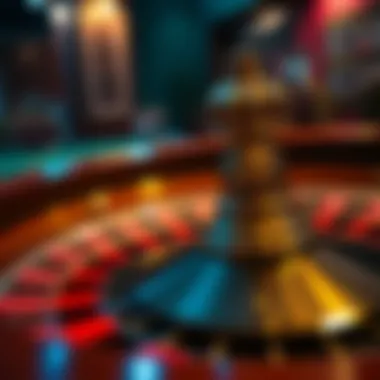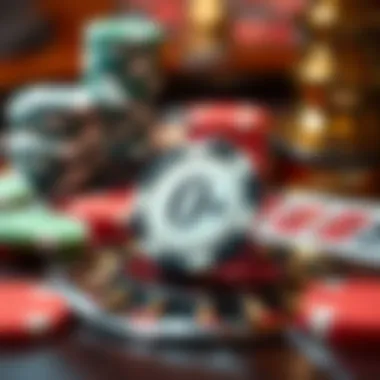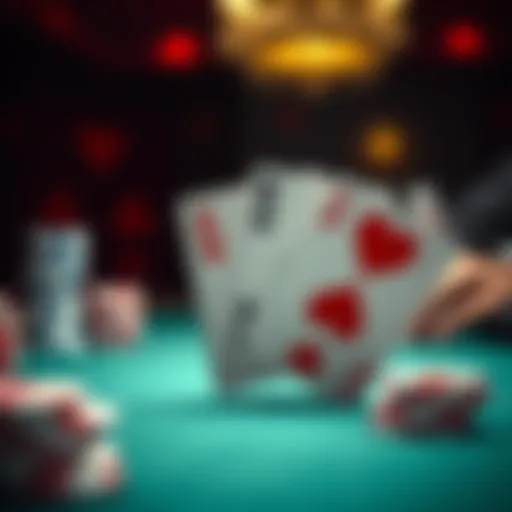Understanding the Odds on Betting 0 in Roulette


Intro
Roulette is that glitzy game that seems to embody all the thrills of the casino world. For many, it’s not just about spinning the wheel or betting on colors; it’s about understanding the odds, especially when zero comes into play. This single digit, the mystique surrounding it, and its impact on the game’s dynamics can sway not only the outcome but your strategy at the table. The 0 in roulette isn’t merely an option; it represents a twist that can make or break your betting fate.
The significance of betting on this unique number stretches well beyond mere luck. Each spin of the wheel presents a whirlwind of mathematical probabilities and potential payouts. Yet, the complexities faced by novices often lend the impression that the game is as simple as it is captivating. This article aims to peel back those layers, delving into how zero affects your odds, your potential winnings, and, ultimately, your overall experience.
As we navigate through various strategies and factors that come into play, this guide will equip players of all experience levels with thoughtful insights on how to approach betting on zero effectively.
Foreword to Roulette
Roulette stands tall as a staple in the world of gambling, wrapping itself in layers of mystery and thrill. Not merely a game of chance, but one steeped in rich history and unique mechanics. Recognizing the essence of roulette is akin to understanding the very heartbeat of a casino. This article will delve into the importance of roulette, setting the foundation for our focus on the significance of betting on zero. Roulette's allure lies not just in spinning wheels and colored pockets, but in the captivating odds associated with each bet, particularly those connected to the elusive zero.
Historical Background
The story of roulette is a captivating tale that roots back to 18th century France. It is believed that mathematician Blaise Pascal was pivotal in its famed creation, although early versions existed long before his time. The name itself comes from the French word for "little wheel," aptly describing its mechanics.
For centuries, roulette evolved, adapting to various cultures and gaming practices. The game became synonymous with luxury in Monte Carlo and has since captured the imagination of gamblers worldwide. Understanding its storied past isn’t just about chronology; it's about appreciating how various elements have shaped the gameplay today, including the prominence of the zero.
Game Variants
Roulette isn't monolithic; it exists in various flavors, each with distinctive qualities that cater to different types of players. The three main variants are European, American, and French roulette, and they each bring something unique to the table.
European Roulette
European roulette is often the darling of the casino floor due to its simpler odds and a more favorable house edge. It features 37 pockets, including numbers 1-36 and a single zero. This layout means players have better statistical chances when betting compared to its American cousin. The absence of a double zero is a key feature that frequently draws novice and seasoned players alike, especially those contemplating bets on zero, as it typically results in a lower house edge.
- Key Characteristic: One zero pocket (0).
- Advantages: Lower house edge, better probability of winning any specific bet.
- Popularity: Favored in many European casinos where players seek to maximize their odds.
American Roulette
American roulette is noted for boasting an additional feature—a double zero (00). This variant includes 38 pockets and is a common sight in many North American casinos. While exciting, the extra pocket increases the house edge significantly, creating a more challenging environment for players.
Many players see it as a riskier option, and for betting on zero, this variant becomes slightly less appealing due to increased odds against them.
- Key Characteristic: Single & double zero pockets (0 and 00).
- Disadvantages: Higher house edge, less favorable odds overall for players.
- Audience: Often attracting those looking for more volatility and excitement.
French Roulette
French roulette shares similarities with the European version, but adds unique rules like "La Partage" and "En Prison," which can lessen the house edge for even-money bets when the ball lands on zero. This makes it an excellent choice for bettors aiming to leverage the number zero.
- Key Characteristic: Enhanced player advantages due to specific rules around zero.
- Advantages: More player-friendly rules can lead to better long-term bets when considering strategies involving zero.
- Attraction: Appeals to strategists and those who enjoy a unique betting experience.
Understanding the Roulette Wheel
The roulette wheel serves as the heart of the game, intricately designed to introduce both excitement and unpredictability. Understanding its workings is pivotal for anyone looking to grasp the nuances of betting, especially when it comes to wagering on that elusive 0. The layout and design not only influence gameplay but also the odds attached to each bet. A good grasp of these elements elevates one’s overall strategy and decision-making during play.
Layout and Design
The layout of the roulette wheel and the accompanying betting table is a study in balance and precision. A typical European roulette wheel features 37 pockets, where the numbers run from 0 to 36. The American variant, on the other hand, adds an additional pocket, the 00, increasing the total to 38. Visually, these numbers alternate between red and black, except for 0 and 00, which are green. This detail holds significance in calculating the odds and potential payouts, especially regarding bets that involve hitting either the 0 or 00.
A player’s choice of strategy can be heavily influenced by the design of the layout. The table is divided into sections for different types of bets, from outside bets on colors to inside bets on individual numbers. "Understanding where the 0 fits into this mix helps players navigate their betting options more effectively."
Among the vital aspects of design is how the dealer spins the wheel. The spin’s direction, combined with the release of the ball, introduces randomness to each game session. This randomness is crucial; it means past outcomes have no bearing on future spins. Hence, whether you're a seasoned gambler or a newbie, knowing the layout and basic design will guide your approach to the game and bets involving 0.


The Role of Zero
The role of zero in roulette is not just a footnote in the game’s narrative; it’s a game-changer. Positioned strategically at the top of the betting layout, the 0 pocket is often viewed with a mix of fear and fascination. It offers unique betting opportunities that can either bolster a player’s winnings or deepen their losses.
From a mathematical standpoint, the inclusion of 0 serves to reduce the odds of winning on outside bets, making them less favorable in terms of payout. For example, while betting on a color (red or black) generally offers nearly a 50% chance of winning, the presence of the 0 lowers that probability to about 48.65% in European roulette. This creates a foundation for house edge, which favors the casino—a critical point for anyone formulating a gambling strategy.
Additionally, when players make a straight-up bet on 0, the payout stands at 35 to 1. This means one could reap significant rewards if luck leans in their favor, although zero is often overlooked compared to other numbers. With this in mind, evaluating the impact of 0 on a player’s overall strategy is essential. Whether it enhances your game plan or serves as a cautionary tale depends on the individual’s approach to risk and reward.
"Zero isn’t just a number; it redefines the odds and strategies in roulette."
Odds in Roulette
Understanding the odds in roulette is like cracking open a book that holds the secrets of the game. For players, knowing these odds isn't just an academic exercise—it’s the key to making informed bets on the table. When we talk about the odds, we're diving into a world where mathematics marries chance, leading to outcomes that can impact the wallet significantly.
When considering any game of chance, odds give players an insight into the likelihood of different outcomes. In the context of roulette, the stakes can get pretty high, especially when you understand that the inclusion of 0—often seen as a special bet—plays a critical role in the overall odds.
Understanding Betting Odds
Betting odds in roulette can sometimes feel like a maze, with various paths leading to different possibilities. When a player approaches the roulette table, they encounter different types of odds depending on their bets. This understanding is crucial. For instance, placing a straight-up bet on a single number, including zero, offers a payout of 35 to 1, a tantalizing prospect for many.
However, the odds here aren't just about the payout. It's vital to grasp the concept of probability behind these bets. The probability illustrates what to expect from your odds. If you place a bet on a single number including zero, there's a 1 in 37 chance on a European wheel, or 1 in 38 on an American wheel. This stark difference highlights why many seasoned players gravitate towards European roulette, as the absence of double zero changes the probabilities in their favor.
Additionally, understanding how to interpret these odds can significantly shape betting strategies. For example, if a player decides to spread their bets across multiple numbers to mitigate risk, the resultant payout changes as well. Each adjustment in strategy enables players to explore various aspects of the odds, creating a more nuanced gambling experience.
Probability of Hitting Zero
Now let's dig deeper into the quirky little number, zero. In the grand game of roulette, the zero isn't just an afterthought; it's a game-changer. The probabilities surrounding zero hit differently compared to other numbers on the wheel. When you're betting on zero, that probability stands out, particularly when you think about how the game nerfs odds against the player.
Specifically, the chance of the ball landing on zero is about 2.63% on a European wheel and 2.63% on the American version as well - don't let that tiny difference fool you; it could cost you. Given that most players lean toward other strategies, focusing on straight bets or wide-ranging outside bets, zero's unique role in the payout structure gives it a fascinating twist.
Players often overlook the importance of this number, but by understanding that zero contributes to the house edge—especially since it affects the outcome of bets such as red/black and odd/even—it becomes easier to appreciate why it holds the spot it does in the game.
The psychological edge of betting on zero can also shouldn't be underestimated; some players may feel it’s an ‘underdog’ bet that could surprise when it strikes.
In summary, the odds in roulette reflect a complicated interplay between strategy, risk, and chance. The nuances of betting odds and the probability of hitting that elusive zero make it quite the fascinating topic – it’s not just raw luck, but a blend of knowledge, intuition, and a splash of daring. Understanding these elements serves as a critical foundation for any gambler looking to navigate the intricacies of roulette betting.
Betting on Zero
Betting on zero in roulette offers a unique perspective within gameplay, warranting deeper scrutiny. As a specific option on the roulette table, zero not only alters the odds but also influences the strategic decisions players may undertake. Its pivotal nature is underscored by the balance it creates in the game's mathematical landscape. Far from being a mere afterthought, the option to wager on zero can lead to significant changes in payout structures and, ultimately, one’s overall betting strategy.
Furthermore, understanding the odds related to the zero can make or break a player’s experience. A gambler’s choices might be swayed by a number of factors, including their risk tolerance, knowledge of betting patterns, and personal philosophy on luck. Grasping the ins and outs of betting on zero is crucial for anyone looking to enhance their odds and refine their strategies.
Types of Bets Involving Zero
Different betting types can be placed involving zero, and each brings something distinct to the table. Knowing these can aid players in devising strategies that suit their comfort levels and styles.
Straight Up Bet
A straight-up bet on zero is the most straightforward option players can make. It involves a wager placed directly on the zero spot on the table. This bet is notably recognized for its high payout, standing at 35 to 1, which makes it immensely appealing. The risk is, of course, that hitting zero is relatively less likely than other outcomes, but the potential reward can be tantalizing for many. This bet embodies a higher risk-reward ratio, meriting attention especially for those who fancy a gamble with a thrilling edge.
Split Bet
A split bet allows players to place a wager not just on zero, but also on an adjacent number. For example, a bet may be placed on both zero and one. This approach still generates good odds, with a payout of 17 to 1, but mitigates some of the risk associated with a straight-up bet. This type is beneficial for players who are willing to expand their chances of winning while maintaining a calculated level of risk, as it covers two potential numbers instead of one.
Corner Bet


When opting for a corner bet, players can place a wager that incorporates zero along with three other numbers that share a corner on the roulette layout, such as zero, one, two, and three. This allows for a broader coverage on the betting board and, typically, a payout of 8 to 1. This can appeal to those who prefer a blend of safety and reward, allowing them to feel like they're in the mix without putting all their eggs in one basket.
Payouts for Zero Bets
When discussing betting, it’s crucial to evaluate what payouts each type of wager brings, particularly when zero is involved. Payouts for zero bets are arranged quite differently compared to other numbers. A straight-up bet could yield considerable returns, but it is essential for players to remember that the house edge remains consistently layered across all bets.
In other words, while the allure of a hefty payout might hook a gambler, the odds aren't stacked in their favor. Understanding these payouts can help manage expectations and, quite frankly, keep players from losing their shirts while at the table. \n
Remember, knowledge is power; the more you understand about the outcomes, the better your chances of walking away satisfied.
Exploring these facets of zero bets enables players to make informed choices, adjust their strategies accordingly, and preferably enjoy their gambling experience. Knowing the ins and outs of these different bets can transform how one approaches the roulette wheel.
Strategic Considerations
When diving into the world of roulette, especially in relation to betting on the 0, strategic considerations take center stage. Understanding the dynamics of zero can be a game-changer for players. The strategies that players choose to follow can significantly affect their overall experience and, ultimately, their success at the table. There’s a nuanced dance between risk and reward that needs careful consideration. Incorporating the zero into a betting strategy not only influences potential payouts but also impacts a player’s mindset and approach to the game.
Incorporating Zero into Strategy
Incorporating zero into your strategy isn’t just about placing a wager on the green slot; it’s about understanding its multifaceted implications. The zero sets the tone for the game, as it affects the odds of all bets placed.
Players often hesitate to include zero in their strategy, but doing so can actually increase the depth of one’s game. For instance, betting on zero can be a bold move that showcases confidence in high-risk scenarios. The zero is a unique bet in itself, but when combined with other bets, it adds an intriguing layer of strategic complexity. This includes strategic betting like playing on adjacent numbers or considering the impact of zero on probabilities in multi-number bets.
Risk Assessment
Evaluating the risks associated with betting on zero is crucial for any serious player. Understanding the house edge and the frameworks for betting systems can lead to more informed decisions.
House Edge
The house edge is a fundamental concept every player should grasp. In roulette, the house edge for games featuring a single zero—like European Roulette—is about 2.7%. This means that for every 100 units wagered, the casino statistically retains 2.7 units. This aspect of the house edge is often seen as a double-edged sword. While it guarantees the house comes out ahead in the long run, it also provides players the chance to strategize around it. By knowing how the house edge functions, players can better assess their approach when betting on zero versus other numbers.
A key characteristic of the house edge is how it influences players’ strategies. Understanding that betting on zero has its quirks can lead players to focus on exploiting lesser-known patterns or scenarios at the table.
Betting Systems
Betting systems, or strategies used to guide betting amounts across multiple rounds, present another layer of consideration. Methods like the Martingale or Fibonacci can be integrated into strategies involving betting on zero. Each system has its own strengths and vulnerabilities, making them worth analyzing in light of the unique characteristics of zero.
A popular approach is the Martingale system, where players double their bet after a loss. This is appealing because it aims to recover lost bets swiftly. However, the system becomes tricky when hitting zero; the risk becomes more profound, as the player’s stack can diminish fast. Conversely, systems like the Fibonacci offer a more measured approach, helping players stay in the game longer without risking excessive loss.
While these systems can provide structure, they also carry inherent risks, particularly when one bets on zero or combinations including it. Understanding these systems’ advantages and disadvantages is crucial for forming a strategy that not only factors in the odds but also the player's risk tolerance.
The End
In the realm of roulette, especially when dealing with the elusive zero, strategic considerations truly shape the gameplay experience. Recognizing how zero influences various dynamics is an essential step for any player looking to enhance their gambling strategy. By thoughtfully considering how to incorporate zero and assessing associated risks, players can navigate the roulette landscape far more adeptly.
The Psychology of Betting on Zero
Understanding the psychology behind betting on zero in roulette is crucial for both players and marketers alike. It goes deeper than just mathematical strategies; it delves into how players think and feel when they place their bets on this particular number. The impact of emotion and cognitive biases plays a significant role in decision-making at the roulette table. Notably, betting on zero can evoke a sense of thrill, considering its unique position in the game. When players choose zero, it often signifies a hope for something exceptional, as it's not just about the odds—it's about the allure of that singular outcome.
Player Perception of Zero
Player perception of zero can vary greatly, and understanding this can shed light on betting strategies. Many gamblers view zero as a double-edged sword—it contains both the potential for high payouts and the risk of losing. This contradictory perception can lead to different betting behaviors.
For some, the attraction to zero is linked to psychological concepts such as the availability heuristic, where the memory of hitting zero becomes more pronounced due to its rarity. Others might experience a feeling akin to gambling addiction when betting on zero, driven by the thrill of an unconventional pick, which can outweigh rational analysis of probabilities.


- Cognitive Bias: A player may overestimate the likelihood of hitting zero simply because they remember instances when they did.
- Risk-Reward Balance: Players often justify betting on zero with its potential 35 to 1 payout despite the odds being against them, reinforcing a high-risk, high-reward mentality.
Players are also influenced by their past experiences and collective stories shared within gambling communities. For instance, if a friend wins big on zero, others may feel inclined to replicate that success.
Behavioral Economics in Roulette
Behavioral economics profoundly impacts how players engage with roulette, especially when it comes to betting on zero. By understanding how human behavior deviates from traditional economic theories, one can predict and analyze betting patterns.
- Loss Aversion: This principle states that individuals prefer to avoid losses rather than acquire equivalent gains. When betting on zero, the potential for loss may loom larger than the excitement surrounding a possible win. This can lead to hesitant or erratic wagering styles.
- Anchoring Effect: Players might anchor their bets by previous outcomes, such as a streak of zeros appearing on the wheel. This can cause them to forget what the actual probabilities are, leading to skewed perceptions of the game.
- Framing Effects: How betting options are presented can heavily influence decisions. If zero is portrayed as a lucky number or associated with favorable stories, players may opt for it more frequently than statistically warranted.
Understanding these psychological aspects not only helps individual players but can also assist marketers in crafting strategies that resonate with potential gamblers. Betting behaviors are not merely about the odds; they encompass a larger narrative involving emotions, perceptions, and cognitive biases.
"The mind shapes the game as much as the wheel does. Zero is not just a number; it’s a mindset for many players.”
Expert Opinions
When diving into the complexities of roulette, especially the unique position of betting on zero, expert opinions provide invaluable insights. These insights help demystify the numbers and strategies, offering a more grounded understanding of how seasoned players approach the game. Drawing from their experiences, expert gamblers can highlight the nuances that often evade newcomers.
One key element is the way these experts view the house edge. Many recognize that while the house has a slight advantage, betting on zero can shift the odds in surprising ways. They analyze the overall gameplay to explain how a player can best leverage their bets around the zero slot. Such perspectives are not just about personal success; they reflect years of careful observation of trends, strategy shifts, and psychological plays.
Additionally, expert opinions can vary based on the type of roulette variant being played. For instance, the European roulette offers one zero, whereas American roulette has both a zero and a double zero. This can make a substantial difference in strategy, as the odds tilt slightly more in favor of the player in the European variant.
Moreover, insights from experts often discuss the balance between intuition and mathematics in betting strategies. Some recommend relying strictly on the odds, while others advocate for a more gut-driven approach, arguing that emotion can play a critical role in gambling success. Whether one leans towards strategic calculations or intuition, the collective wisdom of proven gamblers is indispensable when crafting a betting strategy.
Interviews with Professional Gamblers
In this subsection, we delve into exclusive interviews with professional gamblers who share their thoughts on the strategic complexities of betting on zero. These professionals illuminate how they approach this often-overlooked option, giving readers an inside look into their mindset. Through conversation, they openly discuss common mistakes, their tactical shifts based on table trends, and what it means to place a bet on zero.
For example, one seasoned player stressed understanding the timing of a zero bet: "You can't just throw chips at zero for the heck of it. I wait for moments when the table feels 'heavy.' It’s about reading the atmosphere as much as the odds." Such accounts highlight that successful betting involves more than mathematics; it’s an art that combines insight, timing, and risk management.
"The thrill of roulette lies in the interplay between chance and choice. Zero is your wildcard; it demands respect and attention."
Analysis of Betting Patterns
Understanding betting patterns is another crucial aspect that expert opinions reveal regarding the odds on zero in roulette. Professionals meticulously observe player behavior to predict trends and gain an edge. By analyzing how frequently players bet on zero, they can infer confidence levels and table dynamics that could lead to adjustments in their own strategies.
Some experts keep records of when zero hits, discerning patterns that may or may not exist. Others pay attention to players who frequently win after betting on zero; sometimes the trends reveal interconnected strategies, shedding light on broader betting tactics.
The data gathered can be quite revealing. For instance, if zero is hitting more frequently during particular time slots or following certain betting sequences, it signals a potential opportunity for savvy gamblers willing to leverage that information. This analysis is not merely about hitting the zero but encompasses understanding how the presence of zero affects betting decisions across the board.
In summary, expert opinions enrich the conversation around betting on zero, revealing its layered complexities. From strategic mindset shifts to behavioral analysis, knowing what professionals think allows players to navigate the roulette table with greater insight and understanding.
Finale: The Impact of Zero on Game Outcomes
The inclusion of the number 0 in roulette holds substantial weight in determining not just the outcomes of individual spins but the overall experience of the game itself. Betting on zero can affect players' strategies, perceptions of risk, and the calculations behind winning odds.
While it may seem like a solitary number on the wheel, zero embodies a critical aspect of casino economics. Each time the ball lands on this number, it represents a distinct deviation from conventional winning probabilities. This nuance adds layers to the excitement but also heightens the complexity of gameplay.
Importance of Understanding Zero's Odds
Grasping the odds surrounding the zero is paramount for anyone taking their roulette strategy seriously. The house edge varies depending on the game variant – European wheels have a 2.7% edge while American wheels climb to around 5.26%. This difference arises because the American version includes an additional 00, compounding the outcomes that favor the house.
Knowledge of these odds allows players to make informed bets. Statistically, hitting a zero should be considered not just a lucky strike, but as part of an intelligent wagering strategy that incorporates risk assessment and expected value.
"In the world of roulette, understanding where the zero stands is essential. It's not merely a number; it's the fine line between winning and losing."
Strategic Balance with Zero in Mind
Utilizing zero in betting strategies allows players to diversify their risks effectively. Here are some considerations for integrating knowledge of zero into your strategy:
- Consider Bets that Include Zero: Engaging in straight-up or split bets involving zero can be a smart choice, particularly if they align well with the gambler’s risk appetite.
- Focus on Game Variants: Choosing European roulette over its American cousin could improve overall odds since there’s one less house-biased number.
- Evaluate Emotional Impact: Knowing that zero exists can affect how players perceive their chances. It may lead to more conservative betting or, conversely, to reckless bets fueled by the hope of hitting that solitary number.







